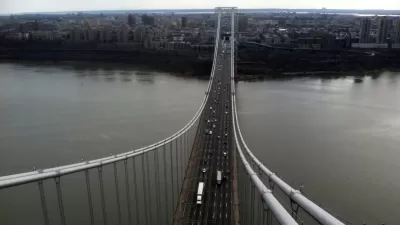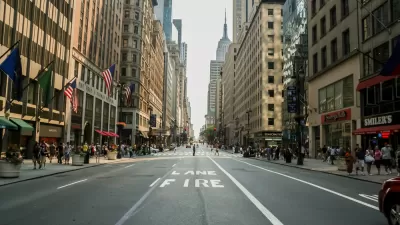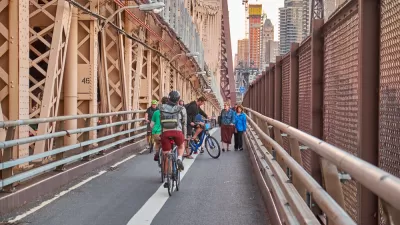With cordon pricing coming to Manhattan in 2021, New Jersey motorists who pay up to $15 in bridge or tunnel tolls don't want to have to pay another $10 to $14 to drive into the Central District Business tolling zone, but exemptions come with a price.

After two failed attempts in 2008 and 2018, congestion pricing (in the form of cordon pricing) finally passed the New York State legislature on March 31 and was signed into law by its chief backer, Gov. Mario M. Cuomo, on April 1. Now the details have to be worked out by a new six-person "traffic mobility review board" under the jurisdiction of the Triborough Bridge and Tunnel Authority, the tolling agency of the Metropolitan Transportation Authority.
While the Manhattan "congestion charge," to use the term that both London and Stockholm use for for their cordon are pricing programs that have successfully operated since 2003 and 2007, respectively, has yet to be determined, "some experts believe it could cost about $14, igniting a fight among interest groups to win exemptions or discounts," writes Emma G. Fitzsimmons, a transit reporter at The New York Times. The current London congestion charge is £11.50 or $15.00; in Stockholm, $8.23.
It's all about "exemptions"
"State leaders were careful to avoid including too many details in the legislation, in part over concerns that it would be harder to pass," write Fitzsimmons and Winnie Hu, a Times metro reporter who has been reporting extensively on the new cordon pricing program, on April 4. Details were left to the traffic mobility review board.
"There are essentially two kinds of exemptions," write Kate Slevin and Alex Matthiessen on April 5 for Streetsblog NYC:
- "Those for drivers who cross another tolled facility on route to the Central Business District or CBD ... and would thus face a 'double toll' (despite drivers commonly pay a double toll when making any number of trips across the city region)
- "Different types or classes of driver who believe they are entitled to relief from the new tolls."
“The intent is not to have a whole list of exemptions,” said Robert Mujica, the state budget director, add Hu and Fitzsimmons. “You’re trying to discourage people from driving into the zone — that’s the only way to reduce traffic."
Furthermore, Slevin and Matthiessen note that the program must "raise a minimum of $15 billion in capital funding for the 2020-24 MTA capital program (which) militates against an excess of carve-outs," i.e., the more exemptions, the higher the congestion charge for everyone who isn't exempted.
"Mr. Mujica said the mobility board will review a traffic study analysis of bridges and tunnels and consider public input before deciding whether to credit drivers who already pay tolls," add Hu and Fitzsimmons.
The board, which will likely have members with experience in public transportation and finance, will also come up with a plan for taxis and ride-hail vehicles, including Uber.
New Jersey
While legislators from throughout the New York metro area are seeking exemptions for their constituents, "the outcry is perhaps loudest in New Jersey," writes Fitzsimmons in the source article.
Gov. Philip D. Murphy of New Jersey said he would fight any effort to double toll drivers who use the George Washington Bridge and then travel into Manhattan’s congestion pricing zone.
The mayor of Jersey City [Steven Fulop] suggested that New Jerseyans should toll New Yorkers entering their state. A congressman [Representative Josh Gottheimer] is calling for federal legislation to guarantee that drivers — who already pay tolls to cross between the states — are not charged twice. Others believe a lawsuit could be filed to stop the tolls.
However, Mujica "did not have much sympathy for New Jersey drivers, saying they should consider abandoning their cars and taking public transit instead."
“New Jersey commuters aren’t being treated any differently,” Mr. Mujica said in an interview. “They’re being treated the same as everyone else driving into the Central Business District.”
Loretta Weinberg, the New Jersey Senate majority leader, "argued that it would only be fair for New Jersey Transit to get a cut of the revenue from congestion pricing" like the two New York commuter railroads, Metro-North and Long Island Rail Road.
“You don't want to make traffic worse on the Jersey side because you’re giving the credits to some and not to others,” said Bruce Schaller, a former New York City transportation official who agrees with Ms. Weinberg that some of the revenue should go to New Jersey Transit.
Fitzsimmons notes that the outcries may achieve results, as transit experts believe drivers using the Lincoln and Holland tunnels, who pay as much as $15 in tolls, "will not be made to pay the full congestion charge."
The final word goes to John Raskin, executive director of the Riders Alliance, an advocacy group.
"Every constituency in town is going to ask for a special exemption and carve out, but part of what makes congestion pricing work is that it’s fair and applies broadly."
Related Planetizen posts:
-
Done Deal: Manhattan Congestion Pricing, April 2, 2019
Hat tip to Kenyon Karl.
FULL STORY: Congestion Pricing Is Coming to New York. New Jersey Wants Revenge.

Alabama: Trump Terminates Settlements for Black Communities Harmed By Raw Sewage
Trump deemed the landmark civil rights agreement “illegal DEI and environmental justice policy.”

Planetizen Federal Action Tracker
A weekly monitor of how Trump’s orders and actions are impacting planners and planning in America.

The 120 Year Old Tiny Home Villages That Sheltered San Francisco’s Earthquake Refugees
More than a century ago, San Francisco mobilized to house thousands of residents displaced by the 1906 earthquake. Could their strategy offer a model for the present?

In Both Crashes and Crime, Public Transportation is Far Safer than Driving
Contrary to popular assumptions, public transportation has far lower crash and crime rates than automobile travel. For safer communities, improve and encourage transit travel.

Report: Zoning Reforms Should Complement Nashville’s Ambitious Transit Plan
Without reform, restrictive zoning codes will limit the impact of the city’s planned transit expansion and could exclude some of the residents who depend on transit the most.

Judge Orders Release of Frozen IRA, IIJA Funding
The decision is a victory for environmental groups who charged that freezing funds for critical infrastructure and disaster response programs caused “real and irreparable harm” to communities.
Urban Design for Planners 1: Software Tools
This six-course series explores essential urban design concepts using open source software and equips planners with the tools they need to participate fully in the urban design process.
Planning for Universal Design
Learn the tools for implementing Universal Design in planning regulations.
Jessamine County Fiscal Court
Caltrans
Institute for Housing and Urban Development Studies (IHS)
City of Grandview
Harvard GSD Executive Education
Toledo-Lucas County Plan Commissions
Salt Lake City
NYU Wagner Graduate School of Public Service





























